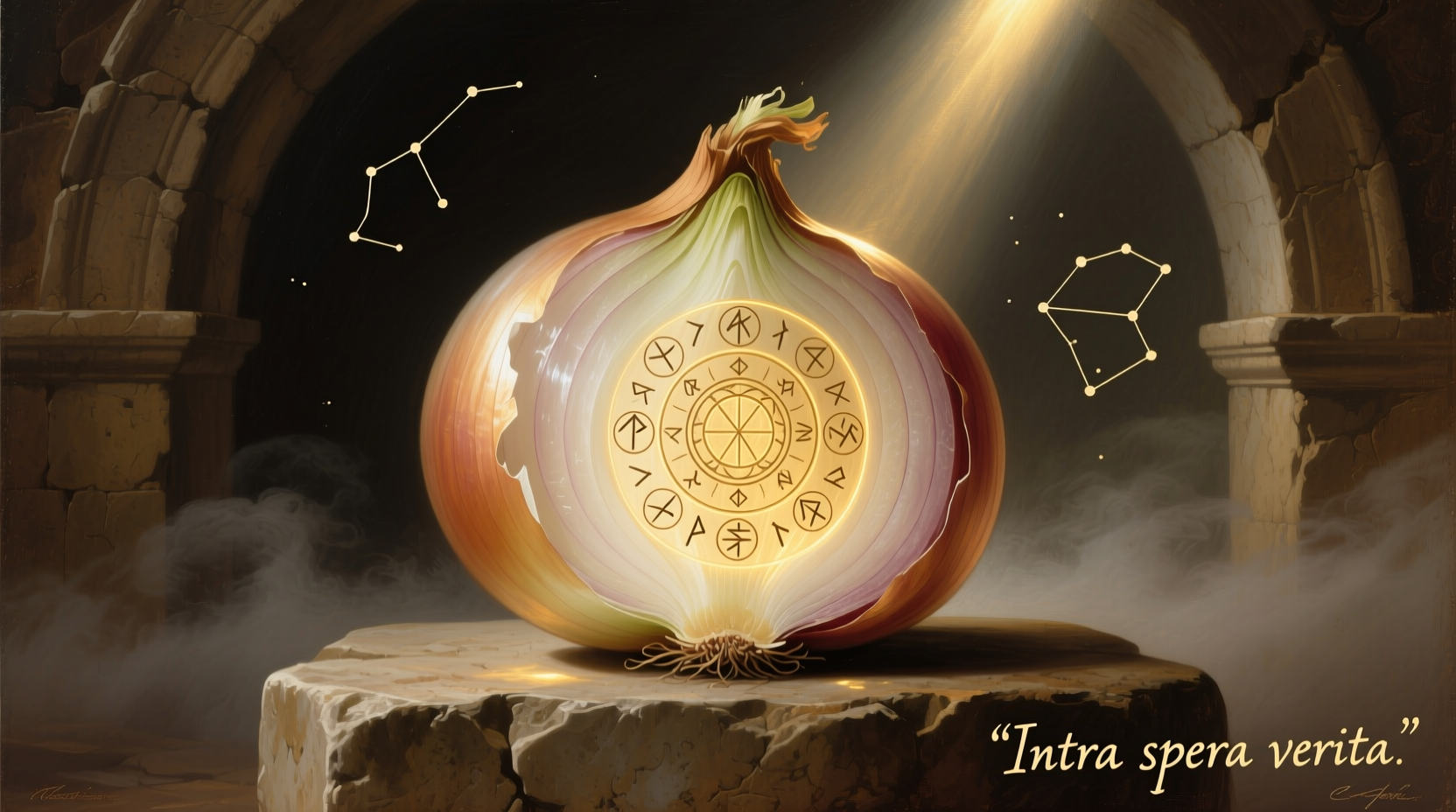The word "onion" refers to both a common edible vegetable (Allium cepa) and carries rich symbolic meanings across cultures. Botanically, it's a bulb-forming plant in the Allium genus. Historically, onions have symbolized eternity, protection, and layered complexity in civilizations from ancient Egypt to modern times.
When you search for "onion meaning," you're likely seeking more than just a dictionary definition. Understanding what onions represent—both literally and symbolically—connects us to thousands of years of human history, culinary tradition, and cultural symbolism. This comprehensive guide delivers exactly that: the complete picture of onion meaning that satisfies both casual curiosity and deeper cultural understanding.
What Exactly Is an Onion? The Botanical Definition
An onion (Allium cepa) is a biennial or perennial plant in the Amaryllidaceae family, though historically classified under Liliaceae. This vegetable forms layered bulbs beneath the soil as a survival mechanism during dry periods. The bulb consists of modified leaves surrounding a short stem, with each layer representing a potential new plant.
Scientific classification reveals why onions behave as they do:
| Taxonomic Level | Classification | Significance |
|---|---|---|
| Kingdom | Plantae | Confirms as photosynthetic organism |
| Family | Amaryllidaceae | Explains sulfur compounds causing tears |
| Genus | Allium | Shared characteristics with garlic, leeks |
| Species | cepa | Distinguishes common onion from other alliums |
This precise botanical understanding helps explain why onions behave as they do in cooking and storage. The sulfur compounds that create their distinctive flavor and cause eye irritation when cut serve as natural pest deterrents in the wild.

The Journey of the Word "Onion": Etymological Evolution
The term "onion" has a fascinating linguistic history that reveals how this humble vegetable traveled across civilizations. Understanding onion meaning requires exploring its etymological roots:
| Era | Term | Language/Culture | Meaning Evolution |
|---|---|---|---|
| Pre-1000 BCE | "piyaz" | Sanskrit | Original term for bulb vegetables |
| 500 BCE | "kippulim" | Hebrew | Biblical reference to onions |
| 100 CE | "unio" | Latin | "union" referring to layered structure |
| 1300 CE | "onion" | Middle English | "one+un" meaning "the onion" |
The word "onion" entered English around the 14th century as "ynyn," derived from the Latin "unio" (meaning "single" or "unity"). This referred to the onion's characteristic of growing as a single bulb, distinguishing it from garlic which grows in clusters. The "on-" prefix was added through a linguistic process called rebracketing, where "an ynyn" became "onion."
Cultural Symbolism: What Onions Represent Around the World
Onions carry profound symbolic meanings that transcend their culinary uses. Ancient Egyptians considered onions sacred due to their spherical shape and concentric rings, which symbolized eternal life. They were even used in oaths—people would swear by placing their hand on an onion.
According to research from the University of Oxford's Food History Project, onions appeared in Egyptian tomb paintings dating back to 3200 BCE and were found in the eye sockets of Ramesses IV's mummy, confirming their religious significance (ox.ac.uk/research/food-history-project).
In medieval Europe, onions symbolized humility and poverty but also protection. Travelers would carry them to ward off illness, and they were hung in homes to absorb disease. This belief stemmed from onions' antimicrobial properties, though people at the time didn't understand the science behind it.
The "Layers" Metaphor: Why We Describe Complex Things as "Onion-Like"
When we describe something as having "layers like an onion," we're tapping into a metaphor with deep roots. This comparison works because:
- Each layer reveals something new when peeled back
- Removing layers changes the whole structure
- Some layers may cause emotional reaction (tears)
- The core remains protected until the end
This metaphor appears in psychology (the "onion model" of personality), literature, and everyday speech. The concept of layered complexity makes onion meaning extend far beyond the vegetable itself.
Practical Applications: Why Understanding Onion Meaning Matters Today
Knowing the full onion meaning enhances several practical aspects of daily life:
Culinary Understanding
Recognizing that different onion varieties carry distinct cultural histories helps you select the right type for authentic recipes. Sweet Vidalias from Georgia versus pungent Spanish onions aren't just taste differences—they represent regional growing conditions and culinary traditions.
Cultural Literacy
When traveling or engaging with diverse communities, understanding onion symbolism prevents cultural misunderstandings. In some Indian traditions, onions are avoided in spiritual contexts, while in others they're essential for protection.
Language Comprehension
Many idioms rely on onion meaning: "peeling back the layers," "crying onion tears," or "the onion of truth." Understanding these expressions enriches communication.
Common Misconceptions About Onion Meaning
Several myths persist about onions that deserve clarification:
- Myth: Onions absorb illness
Reality: While onions have antimicrobial properties, they don't "soak up" diseases from the air - Myth: The term "onion" comes from "on one"
Reality: It evolved from Latin "unio" through Middle English - Myth: All cultures view onions positively
Reality: Some religious traditions restrict onion consumption for spiritual reasons
These clarifications help ensure your understanding of onion meaning remains accurate and culturally sensitive.
Exploring Onion Meaning Across Different Contexts
Onion meaning shifts depending on context:
- Botanical context: Focuses on plant classification and growth patterns
- Culinary context: Emphasizes flavor profiles and cooking applications
- Cultural context: Highlights symbolic meanings across civilizations
- Linguistic context: Traces etymological development of the word
- Metaphorical context: Explores the "layers" concept in abstract thinking
Recognizing these different dimensions prevents oversimplification when discussing onion meaning.
FAQ: Frequently Asked Questions About Onion Meaning
What is the original meaning of the word onion?
The word "onion" derives from the Latin "unio," meaning "single" or "unity," referring to the onion's characteristic of growing as a single bulb. It entered Middle English as "ynyn" around the 14th century before evolving into "onion" through linguistic rebracketing.
Why are onions considered symbolic in many cultures?
Onions symbolize eternity due to their concentric rings (Egypt), protection because of their antimicrobial properties (medieval Europe), and layered complexity in philosophical thinking. Their spherical shape with endless layers made them powerful symbols across civilizations.
What does "onion meaning" refer to in culinary contexts?
In culinary contexts, onion meaning refers to understanding how different onion varieties contribute distinct flavor profiles to dishes. It encompasses knowledge of when to use sweet onions versus pungent varieties, how cooking transforms their chemical compounds, and their role in building flavor foundations across global cuisines.
How has the meaning of onions changed throughout history?
Onions evolved from sacred objects in ancient Egypt (3200 BCE) to staple food across civilizations. During the Middle Ages, they symbolized both poverty and protection. In modern times, they've become culinary essentials while retaining metaphorical significance as symbols of layered complexity in psychology and literature.
Why do people say something has "layers like an onion"?
This metaphor describes something with multiple levels of complexity, where understanding requires peeling back successive layers. Like an onion, each layer reveals new information, and the process might be emotionally challenging (causing "tears"). The phrase appears in psychology, literature, and everyday language to describe complex systems or personalities.











 浙公网安备
33010002000092号
浙公网安备
33010002000092号 浙B2-20120091-4
浙B2-20120091-4